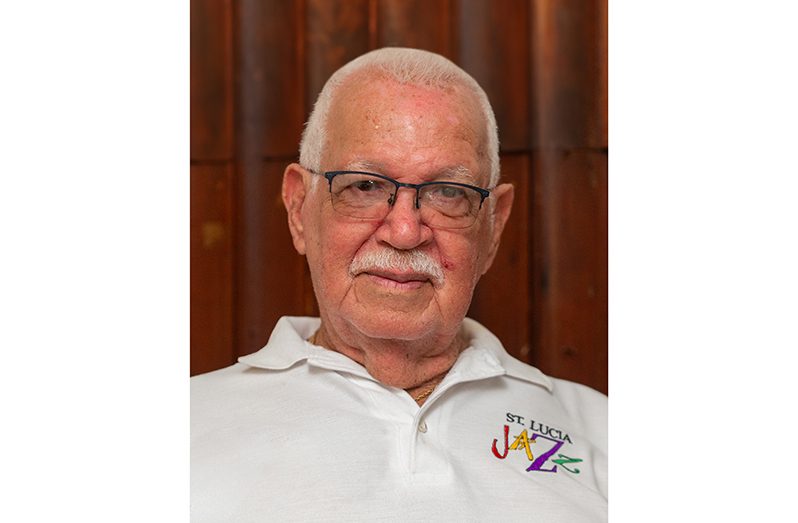Joseph ‘Reds’ Perreira to receive honorary Doctorate from the University of Guyana
During the early 1960s through the ‘70s and into the ‘80s, Joseph Perreira was the voice of cricket all over the West Indies. Joseph is otherwise and perhaps more popularly known as ‘Reds’, a name he earned not only due to his complexion but also for his intense tenacity in commentary.
For over five decades, ‘Reds’ has dedicated himself to advancing sports in Guyana and the Caribbean. And today, after overcoming numerous challenges and decades dedicated to the advancement of sports, Reds is being honoured in a way that very few people will ever experience. He will be given an honorary doctorate from the University of Guyana. When asked how he felt about his accomplishment, he shared that the only thing he feels is “humble and happy.”
Reds was born over 80 years ago in the Pomeroon on the Essequibo Coast. Coming from humble beginnings, Reds was the son of a farmer and the fifth of his nine siblings. His boyhood years were taken up with all the activities of living in the country. Reds first step into sport came in 1945, when his family moved to Charlestown, closer to the capital city and in the ‘thick of things’. Here is where his interest in the fast footwork of football and the excitement of fast bowling caught his attention as a young boy, and it seemed as though it never let him go.
Reds explained that his upbringing has taught him a great deal of strength and humility that is forged by growing amidst adversities. Before he was the voice that precisely chronicled sports matches, capturing every goal, wicket and knockout punch, Reds was just a young boy with a severe stutter. Today, Reds is known for his words and captivating descriptions of games before the era of television. But there was a time when the sounds of Rs and S’s proved challenging as they would get caught in his throat.
“I had to overcome my stutter; it was major. It was a handicap,” Reds stated. He explained that his stutter was something he battled with, particularly because there was no cure for it. “It is not easy because you can not go to the store and get a prescription and have it go away in a month. It took great strength and confidence to overcome stammering. I had to repeat words I could not repeat. Rodriquez, Sri Lanka and Richardson, the R’s and the S’s would twist me up,” he said.
By 20, however, he had successfully overcome his stutter. Even during his first test match in 1971, Reds still had a bit of a stutter that he fought hard to contain. And on the stage of five million people listening to him, Reds’ illustrious voice carried without a single stutter. In the years that followed, his experience across sports disciplines grew as he worked for several different sports associations. He went on to be a part of the Organisation of Eastern Caribbean States (OECS) as its director and President of the St. Lucia Boxing Association (SLBA). But his most memorable moments are travelling through the Caribbean while bringing Windies sport to the rest of the world, whether by radio or television.
In reminiscing about his past, Reds recalled in a list several outstanding moments in his career. “My days of cricket broadcasting here in Guyana and the Caribbean and then the wide world; my days as a football coach with Santos, with the BGCC and with the national under-23 team; my days with the West Indies travelling with Sir Clive Lloyd and Sir Vivian Richards when the West Indies were winning in the World Cup in 1975 and then 1979. I certainly feel like I was lucky. But would like to state that it is important to remain humble,” he said.
Reds left Guyana in 1980. Since then, he has returned regularly, although he now resides in St. Lucia. He stated that as much as he left Guyana, it will always remain his home. “There is a song called Hotel California. And I left Guyana in 1980, but I never really left Guyana. I left to do a world title fight with Patrick Ford and Salvador Sanchez in Texas. That was for television. And I took the opportunity to work in Barbados to expand my horizons. I developed because of the opportunity and the Caribbean Broadcasting Union flew me all over the world. The song I refer to says, ‘You can check out, but you can never leave.’ I checked out in 1980, but I never left Guyana.” Reds stated.
Reds’ love for sport stems from the larger impact it could have on young people and the hope it can give to a country. He expressed that,“Sports in Guyana has a tremendous impact on crime. If you can get young people away from the bridges, away from the block and playing sports, you can change their lives. There is the classical case of when the World Cup is on in some countries, crime dropped, because of young people and people in general watching the World Cup. Sports has the ability to change people’s lives, and build character and give people hope.”




.jpg)









